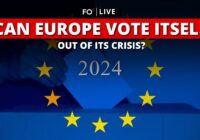When Emmanuel Macron admits his own cowardice, the English-speaking media cover it up. The Daily Devil’s Dictionary explains.
Emmanuel Macron has finally stepped up to his presidential perch to address the yellow army that has rebelled against his reforms. It turned out to be a kind of confession or partial admission of guilt.
President Macron’s choice of words (in French) is worth paying attention to. Describing the plight of the protesters, he says: “Leur détresse ne date pas d’hier mais nous avions fini lâchement par nous y habituer.” The translation used in most English-speaking media leaves out a key word: “Their distress doesn’t date from yesterday. We have ended up getting used to it.”
Here is today’s 3D definition:
Lâchement:
Literal translation: In a cowardly manner
Contextual note
The Daily Devil’s Dictionary regularly attempts to dig under the meaning of the words used by public personalities in English. Like all French presidents, Macron speaks with dignity, elegance and style in French, usually making it easy to translate into English. Why then were the English translators stumped by the word “lâchement”?
Macron wanted to appear humble, accusing himself of a mild form of cowardice, mild because the “nous” (we) suggests the sin wasn’t his alone. Could this be a case of the Trump effect? In the English-speaking world, politicians should never apologize and, even less accuse themselves of a moral weakness. It would undermine their dignity and compromise their fundamental right — if not duty — of assertiveness.
On the other hand, it may simply be due to the difficulty of turning the adjective “cowardly,” which already ends with the suffix “-ly,” into an adverb, as we do with most other adjectives, such as bravely, stupidly or happily. The translator might have proposed: We have ended up, in our cowardly way, getting used to it. But apart from being awkward, it would be somewhat misleading, implying that President Macron, in some permanent sense, is cowardly, whereas he clearly means that it applies only to this particular case.
Historical note
A more culturally pertinent explanation may be that in this traditionally Catholic nation — even though the French République has, for over a century, been officially and even militantly secular — the act of confession carries a degree of moral force that is absent in Protestant English-speaking countries, where it signals weakness. As at least one commentator noted, what Macron presented in his televised speech on December 10 resembled an act of “penitence.”
Macron even admitted the specific sin of “hurting” (or injuring) some people with words spoken on some previous occasion: “Il m’est arrivé de blesser certains d’entre vous par mes propos.” (Literally, “It has happened that I have hurt some of you with my discourse.”) Note that it happened to him, not by him. This nevertheless sounds very serious and would be an appropriate thing to cite in confession. Macron wants to sound humble and contrite before taking on the priest’s role and announcing the terms of his own penance: a list of specific reforms that he believes respond to the complaints of the gilet jaune movement.
 Macron is not a practicing Catholic, though he was a teenage convert hailing from a secular family. After schooling with the Jesuits and graduation from the prestigious ENA, guaranteeing his entrance into the political aristocracy, Macron worked as an editorial assistant with the famous Protestant philosopher, Paul Ricoeur, for one of his books. With no party affiliation, he later became minister of the economy under the socialist president Hollande.
Macron is not a practicing Catholic, though he was a teenage convert hailing from a secular family. After schooling with the Jesuits and graduation from the prestigious ENA, guaranteeing his entrance into the political aristocracy, Macron worked as an editorial assistant with the famous Protestant philosopher, Paul Ricoeur, for one of his books. With no party affiliation, he later became minister of the economy under the socialist president Hollande.
As a member of the modern French patrician class, who has suddenly found himself in a supremely embarrassing situation, the temptation was great to draw on the moral tradition of the Catholic Church by creating at least a semblance of “sincere” confession to re-establish the legitimacy he has clearly lost in the eyes of a majority of the electorate.
But they clearly didn’t consider sincere either his confession or his proposal of reforms intended to respond to at least some of their grievances. Invited by national television (France 2) to comment on Macron’s “confession,” one of the most articulate voices of the gilet jaune movement, Hayk Shahinyan, described the real complaint, that “in a country we call democratic, the people simply want to get their sovereignty back.” He highlighted the common perception of Macron’s endemic disdain for the people, suggesting that his confession will not calm the storm. Shahinyan hinted that the gilets jaunes are already organizing to be present in the coming European elections. The movement is morphing into a political cause.
If it is followed up, this is a bombshell. Macron profited from the collapse of the traditional right and left-wing parties in France to get elected, almost by default. But he failed to create a viable party, even though in the confusion of 2017 he pushed through a comfortable majority in the French parliament, with the next election scheduled for 2022.
The distress that Emmanuel Macron may now need to get used to is that of an entire political class that has been discredited. Whether the people can make themselves heard without a new Robespierre stepping up to impose revolutionary terror in the name of superior reason remains to be seen. But if Shahinyan’s calm, rational discourse sets the tone for the political version of gilets jaunes, politics in France may be undergoing an interesting sea-change.
*[In the age of Oscar Wilde and Mark Twain, another American wit, the journalist Ambrose Bierce, produced a series of satirical definitions of commonly used terms, throwing light on their hidden meanings in real discourse. Bierce eventually collected and published them as a book, The Devil’s Dictionary, in 1911. We have shamelessly appropriated his title in the interest of continuing his wholesome pedagogical effort to enlighten generations of readers of the news.]
The views expressed in this article are the author’s own and do not necessarily reflect Fair Observer’s editorial policy.
Support Fair Observer
We rely on your support for our independence, diversity and quality.
For more than 10 years, Fair Observer has been free, fair and independent. No billionaire owns us, no advertisers control us. We are a reader-supported nonprofit. Unlike many other publications, we keep our content free for readers regardless of where they live or whether they can afford to pay. We have no paywalls and no ads.
In the post-truth era of fake news, echo chambers and filter bubbles, we publish a plurality of perspectives from around the world. Anyone can publish with us, but everyone goes through a rigorous editorial process. So, you get fact-checked, well-reasoned content instead of noise.
We publish 2,500+ voices from 90+ countries. We also conduct education and training programs
on subjects ranging from digital media and journalism to writing and critical thinking. This
doesn’t come cheap. Servers, editors, trainers and web developers cost
money.
Please consider supporting us on a regular basis as a recurring donor or a
sustaining member.
Will you support FO’s journalism?
We rely on your support for our independence, diversity and quality.






